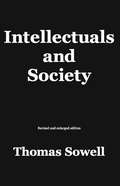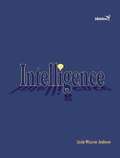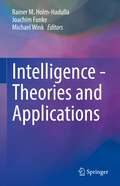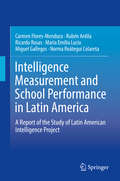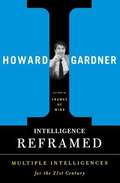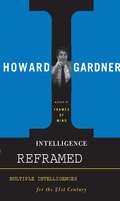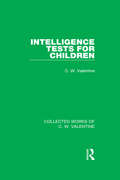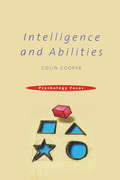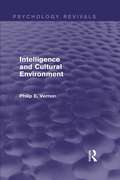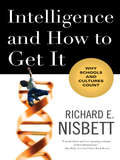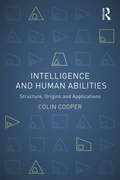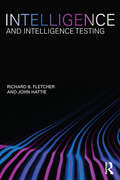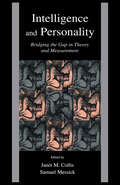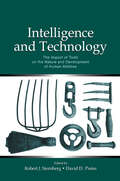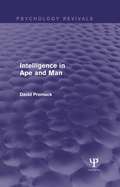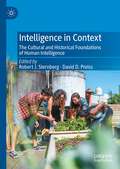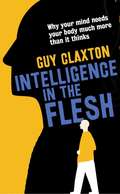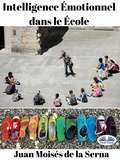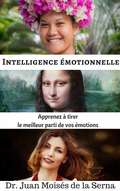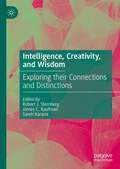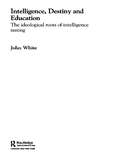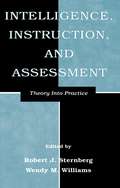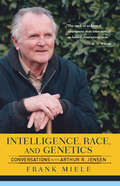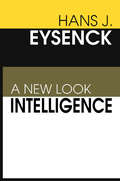- Table View
- List View
Intellectuals and Society
by Thomas SowellHow intellectuals as a class affect modern societies by shaping the climate of opinion in which official policies develop--on issues ranging from economics to law to war and peace
Intelligence
by Linda Wasmer AndrewsWhat is intelligence? Is it solving a difficult math problem, knowing how to build a skateboard, or having good social skills? Depending on your point of view and the culture you live in, any one of these answers may be correct. Intelligence takes a closer look at what it means to be smart. Find out how scientists test intelligence and how new ideas are being used in the classroom. You can even learn how to make the most of your brainpower with a few simple tips. Life Balance navigates the challenges of everyday life. Featuring real-life situations and helpful resources, each book gives readers the tools they need to make positive changes and smart decisions. Filled with facts, advice, and solutions, Life Balance is about finding the way to a healthy and happy life.
Intelligence - Theories and Applications
by Michael Wink Joachim Funke Rainer M. Holm-HadullaIntelligence allows people to understand events and to shape their surrounding environment. This book delves deeper into the theories and applications of intelligence, showing it is a multifaceted concept —defined and explained differently by prestigious experts of various disciplines in their own research. The book provides interdisciplinary connections of intelligence as it relates to a variety of clearly outlined subject areas, and should lead to a deep understanding of the phenomenon as it pertains to practical applications in different domains. Contributors in this volume present results from evolutionary biology, mathematics, artificial intelligence, medicine, psychology, cultural studies, economy, political sciences and philosophy. Individual scientific models are integrated in an interdisciplinary concept of wisdom. This volume will help enhance the common understanding of intelligence for fellow researchers and scientists alike.
Intelligence Information Thinking
by Edward De BonoEdward de Bono has been called 'the father of thinking about thinking'. He is the originator of the concept - and formal tools - of Lateral Thinking. He is regarded by many as the leading authority in the field of creative thinking, innovation and the direct teaching of thinking as a skill.
Intelligence Measurement and School Performance in Latin America: A Report of the Study of Latin American Intelligence Project
by Carmen Flores-Mendoza Rubén Ardila Ricardo Rosas María Emilia Lucio Miguel Gallegos Norma Reátegui ColaretaThis book presents the results of the most complete and updated assessment of cognitive resources of students in Latin America: the Study of Latin American Intelligence (SLATINT). During four years, top researchers of the region used a standardized set of cognitive measures to assess 4,000 students aged between 14 and 15 years from six countries: Brazil, Argentina, Mexico, Chile, Colombia and Peru. The data collected and now analyzed in this volume is a first step to understand the human cognitive capital of the region, a crucial resource for any country today. Intelligence research has shown that the cognitive skills of a population are strongly associated with the school performance of its students and the development of a nation. This makes Intelligence Measurement and School Performance in Latin America a valuable tool both for Latin American researchers and authorities engaged in the improvement of each country’s human resources and for psychologists, educators and other social scientists dedicated to the study of the impact of intelligence in the development of nations.
Intelligence Reframed: Multiple Intelligences for the 21st Century
by Howard GardnerGardner (cognition and education, Harvard U.) broadens his theory of multiple intelligences first posited in 1983 to include intelligences of the existential and naturalist types and multiple forms of creativity. The McArthur genius award recipient advises on applications of his theory, responds to critics, and provides global contacts on MI theory.
Intelligence Reframed: Multiple Intelligences for the 21st Century
by Howard GardnerHarvard psychologist Howard Gardner has been acclaimed as the most influential educational theorist since John Dewey. His ideas about intelligence and creativity - explicated in such bestselling books as Frames of Mind and Multiple Intelligences (over 200,000 copies in print combined) - have revolutionized our thinking. In his groundbreaking 1983 book Frames of Mind, Howard Gardner first introduced the theory of multiple intelligences, which posits that intelligence is more than a single property of the human mind. That theory has become widely accepted as one of the seminal ideas of the twentieth century and continues to attract attention all over the world. Now in Intelligence Reframed, Gardner provides a much-needed report on the theory, its evolution and revisions. He offers practical guidance on the educational uses of the theory and responds to the critiques leveled against him. He also introduces two new intelligences (existential intelligence and naturalist intelligence) and argues that the concept of intelligence should be broadened, but not so absurdly that it includes every human virtue and value. Ultimately, argues Gardner, possessing a basic set of seven or eight intelligences is not only a unique trademark of the human species, but also perhaps even a working definition of the species. Gardner also offers provocative ideas about creativity, leadership, and moral excellence, and speculates about the relationship between multiple intelligences and the world of work in the future.
Intelligence Tests for Children (Collected Works of C.W. Valentine)
by C.W. ValentineOriginally published in 1945, this title was intended mainly for use by teachers wishing to test children from ages 2-8 in order to establish their intelligence. Based on feedback to the author, this revised edition also includes tests for children up to the age of 15. The tests were used to give a teacher some idea of how much could be expected of each child, so that the class, when practicable, could be divided into groups of varying abilities, which could proceed at paces suited to their respective capacities. It was felt that if ‘inborn intellectual deficiencies’ could be identified at an early age the children could have ‘special treatment’, or in certain cases be placed in a ‘special school’, rather than be potentially written off as ‘lazy’. Today this can be read and enjoyed in its historical context.
Intelligence and Abilities
by Colin CooperResearch into abilities is one of the great success stories of psychology. Ability tests are widely used and there is continued interest in the origins of abilites (enes or environment?) and their links to social phenomena such as crime and welfare dependecy. Intelligence and Abilities explains what is known about the processes associated with mental abilities and the relationship of abilities to behaviour. It also provides a clear and up-to-date guide to the main areas of research.
Intelligence and Cultural Environment (Psychology Revivals)
by Philip E. VernonOriginally published in 1969, Intelligence and Cultural Environment looks at the concept of intelligence and the factors influencing the mental development of children, including health and nutrition, as well as child-rearing practices. It goes on to discuss the application of intelligence tests in non-Western countries and includes both British and cross-cultural studies to illustrate this. Inevitably a product of the time in which it was written, this book nonetheless makes a valuable contribution to intelligence theory as we know it today.
Intelligence and How to Get It: Why Schools and Cultures Count
by Richard E. Nisbett"[Nisbett] weighs in forcefully and articulately . . . [using] a thoroughly appealing style to engage . . . throughout."--Publishers Weekly Who are smarter, Asians or Westerners? Are there genetic explanations for group differences in test scores? From the damning research of The Bell Curve to the more recent controversy surrounding geneticist James Watson's statements, one factor has been consistently left out of the equation: culture. In the tradition of Stephen Jay Gould's The Mismeasure of Man, world-class social psychologist Richard E. Nisbett takes on the idea of intelligence as biologically determined and impervious to culture with vast implications for the role of education as it relates to social and economic development. Intelligence and How to Get It asserts that intellect is not primarily genetic but is principally determined by societal influences.
Intelligence and Human Abilities: Structure, Origins and Applications
by Colin CooperChoice Recommended Read Psychological research into human intelligence and abilities presents us with a number of difficult questions: Are human abilities explained by a single core intelligence or by multiple intelligences? How should abilities be assessed? With tests unlike the problems which people normally have to solve, or with practical problems closer to those encountered in life, school and work? Do ability tests predict how a person will behave? If so, can they predict whether a person will succeed at school and at work? Intelligence and Human Abilities critically evaluates research evidence from the past 100 years to consider these and other issues. It shows that, despite the apparent contradictions in this research, the evidence in fact supports one coherent model, a fact which has clear implications for researchers, educators and test-users. This clear and engaging text provides an up-to-date evaluation of what the empirical evidence tells us about the number, nature and origins of human abilities. It will be essential reading for students and practitioners of psychology and education, and also for users of ability tests such as applied psychologists and personnel managers.
Intelligence and Intelligence Testing
by John Hattie Richard B FletcherHave you ever wondered what IQ is and how it is measured? Why is there such a premium placed on high IQ? What do we mean by intelligence? What does your IQ score mean? There can be no denying the enduring appeal of IQ over the last century. It is probably one of the most misunderstood yet highly researched psychological constructs ever. Such has been the controversy surrounding this topic that it is difficult to distinguish fact from fiction. Intelligence and Intelligence Testing is a text that aims to address that. This book examines the controversial psychological construct that is IQ, discussing and reviewing the history and current status of the research on intelligence and providing an overview of its development, measurement and use. From Galton, Spearman and Binet to the relatively recent controversy caused by the research of Herrnstein and Murray, this important book makes a major claim about the importance today of ‘problem solving on demand’ as one of the key components of today’s notions of intelligence. Chapters include coverage of: Intelligence and schooling; Cultural differences in views of intelligence; The history of IQ testing and its emergence into public consciousness; IQ as predictor of educational and occupational outcomes; Psychometrics and measurement of intelligence; The future of intelligence research. Written by Richard B. Fletcher and John Hattie, the author of the highly-regarded Visible Learning, this textbook will be invaluable for all undergraduate and Masters level students studying the theory of intelligence and the impact of testing on educational. Detailed and annotated further reading lists and a glossary of terms are also included.
Intelligence and Personality: Bridging the Gap in Theory and Measurement
by Janet M. Collis Samuel MessickThis volume brings together leading researchers in a major new effort to bridge the historical gap between the domains of ability and personality. The result is a remarkable collection of chapters analyzing critical issues at the interface--style, structure, process, and context. Contributors address: * intelligence and its relation to temperament and character-hierarchical models of cognition and personality; judgmental data in personality research; and structural issues in ability and personality; * intelligence and conation-goal theories; the role of conation in the learning environment; motivation and arousal; * intelligence and style-stylistic preferences; the role of disposition; cognitive style and its measurement; test taking style; and * intelligence and personality in context-regularities of functioning; contextual effects in cultural variation; control and consistency; the concept of "successful intelligence."
Intelligence and Technology: The Impact of Tools on the Nature and Development of Human Abilities (Educational Psychology Ser.)
by Robert J. Sternberg David D. PreissIn this volume, Robert J. Sternberg and David D. Preiss bring together different perspectives on understanding the impact of various technologies on human abilities, competencies, and expertise. The inclusive range of historical, comparative, sociocultural, cognitive, educational, industrial/organizational, and human factors approaches will stimula
Intelligence in Ape and Man (Psychology Revivals)
by David PremackWhat is language and what is the nature of the intelligence that can acquire it? This volume, originally published in 1976, describes 10 years of research devoted to these questions. The author describes his programmatic research of decomposing language into atomic constituents, designing and applying training programs for teaching these to chimpanzees, and for teaching chimps major human ontological categories, as well as for interrogative, declarative, and imperative sentence forms. The volume details the progress from teaching apes simple predicates such as same–different, to more complex predicates such as if–then, and the success of the program led to the following questions directly related to intelligence: What made the training program effective? What is the cognitive equipment of the species which enables it to learn language? What does this tell us about human intelligence? The answers were suggested in terms of conceptual structure, representational capacity, memory and the ability to handle second-order relations. The results of this experimentation, which resulted in synonymy in some animals, shed light not only on the nature of language, but the nature of intelligence as well. One of the earliest ape language and intelligence studies, today this classic can be read and enjoyed again in its historical context.
Intelligence in Context: The Cultural and Historical Foundations of Human Intelligence
by Robert J. Sternberg David D. PreissThis book reflects on the various ways in which intelligence can manifest itself in the wide range of diverse contexts in which people live. Intelligence is often viewed as being tantamount to a score or set of scores on a decontextualized standardized intelligence test. But intelligence always acts within a sociocultural context. Indeed, early theorists defined intelligence in terms of adaptation to the environment in which one lives. The tradition of decontextualization is old, dating back to the very beginning of the 20th century with the development of the Binet-Simon Intelligence Scales. This tradition is not only old, however, but obsolete. Because people live in different sociocultural as well as physical environments, intelligence can take somewhat different forms in different places and even at different times. The chapters in this edited volume show that intelligence viewed in the abstract is a somewhat vacuous concept - it needs to be contextualized in terms of people’s physical and sociocultural surroundings.
Intelligence in the Flesh
by Guy ClaxtonIf you think that intelligence emanates from the mind and that reasoning necessitates the suppression of emotion, you'd better think again--or rather not "think" at all. In his provocative new book, Guy Claxton draws on the latest findings in neuroscience and psychology to reveal how our bodies--long dismissed as mere conveyances--actually constitute the core of our intelligent life. From the endocrinal means by which our organs communicate to the instantaneous decision-making prompted by external phenomena, our bodies are able to perform intelligent computations that we either overlook or wrongly attribute to our brains. Embodied intelligence is one of the most exciting areas in contemporary philosophy and neuropsychology, and Claxton shows how the privilege given to cerebral thinking has taken a toll on modern society, resulting in too much screen time, the diminishment of skilled craftsmanship, and an overvaluing of white-collar over blue-collar labor. Discussing techniques that will help us reconnect with our bodies, Claxton shows how an appreciation of the body's intelligence will enrich all our lives.
Intelligence Émotionnel dans le École
by Juan Moisés de la SernaParler de l'Intelligence émotionnelle est de le faire maintenant, en termes de développement de la personne, un aspect qui a été en plein essor depuis des dizaines d'années et dont la portée a été utile non seulement dans le champ si vous n'avez pas également. De plus en plus, il y a plus d'études qui s'accumulent sur les avantages d'un bon développement de l'Intelligence Émotionnelle, recommandé pour être formé en elle-le plus tôt sera le mieux. Par conséquent, l'école est le droit de l'environnement pour les petits et même les adolescents à connaître et à développer l'Intelligence Émotionnelle.
Intelligence émotionnelle: Apprenez à tirer le meilleur parti de vos émotions
by Sophie Martin Juan Moises de la SernaS’il y a un sujet dont on a beaucoup parlé ces dernières années dans le domaine de la psychologie, c’est l’intelligence émotionnelle (IE), d’abord comme un des développements de l’étude des émotions humaines et leurs implications dans la vie, et devant acquérir par la suite un rôle de premier ordre dans des champs aussi importants que l’éducation ou l’entreprise, en raison des bénéfices observés aussi bien sur l’efficacité que sur le plaisir de vivre chez les personnes qui travaillent leur IE. Dans cet ouvrage, nous aborderons les plus récentes investigations concernant l’IE, nous parlerons de sa définition et de ses conséquences, mais nous verrons surtout comment la mettre en pratique dans notre vie quotidienne afin d’en obtenir les plus grands bienfaits possible. En terminant ce livre, développer votre intelligence émotionnelle vous apparaîtra comme une démarche indispensable.
Intelligence, Creativity, and Wisdom: Exploring their Connections and Distinctions
by Robert J. Sternberg James C. Kaufman Sareh KaramiThis edited collection examines the interrelationships between the psychological concepts of intelligence, creativity, and wisdom, while also presenting a systematic attempt to combine them within the overarching concept of meta-intelligence. Building on Robert J. Sternberg’s previous work, this authoritative volume brings together leading researchers in the field of intelligence, creativity, and wisdom to show the latest advances in this line of research through a selection of 18 chapters. Using a wide range or approaches, including psychological, cognitive, educational, and philosophical perspectives, internationally renowned scholars offer insights into the benefits of re-thinking our understanding of intelligence, creativity, and wisdom, and how they may helpfully be more integrated.This wide-ranging collection will appeal in particular to students and scholars of cognitive, differential, social, developmental, and educational psychology, as well as creativity studies, education, philosophy, and related disciplines.
Intelligence, Destiny and Education: The Ideological Roots of Intelligence Testing
by John WhiteThe nature of intelligence and how it can be measured has occupied psychologists, educationalists, biologists and philosophers for hundreds of years. However, there has been little investigation into the rise of the traditional dominant educational ideology that intelligence and IQ have innate limits and are unchanging and unchangeable. This book traces the roots of this mind set back to early puritan communities on both sides of the Atlantic, drawing parallels between puritan dogma and the development of the traditional curricula and selection processes that are still firmly embedded in school practice today. Drawing on the work of Galton, Pearson, Burt, Goddard, Terman and others in his search for the truth about intelligence testing, John White looks at the personal histories and socialised religious backgrounds of these key psychologists and casts an entirely new light on schooling in Britain and the USA in modern times. This work also shows how we can transcend this heritage and base our educational system on values and practices more in tune with the twenty-first century.
Intelligence, Instruction, and Assessment: Theory Into Practice (Educational Psychology Series)
by Robert J. Sternberg Wendy M. WilliamsIntelligence, Instruction, and Assessment shows how modern theories of intelligence can be directly applied by educators to the teaching of subject matter, regardless of the age of the students or the content being taught. It is intended primarily for teachers at all levels--elementary, secondary, tertiary--who want to apply in their classrooms what we know about intelligence. The focus is not on modifying students' intelligence, per se, but on increasing their disciplinary knowledge and understanding. Hence, this book will help teachers learn how they can teach more effectively what they are already teaching. The assumption is that what teachers care most about is how they can improve upon what they are already doing, and how they can learn what they need to do in order to be more effective in their work. The contributors are well known for their work on intelligence and education. Each chapter includes an accessible explanation of the author's theory of intelligence, and discusses the implications of that theory both for instruction and for assessment. The book is international in scope, reflecting both American and European perspectives. Anyone interested in knowing how modern theories of intelligence can be applied to education will want to read this book--particularly teachers and other education specialists, as well as developmental psychologists, cognitive psychologists, and philosophers with an interest in applying psychological theory to classroom practice. It will serve well as a text for courses on educational psychology, intelligence, cognition and instruction, and foundations of teaching.
Intelligence, Race, and Genetics: Conversations with Arthur R. Jensen
by Frank MieleConversations with controversial psychologist Arthur R. Jensen on the nature of intelligence, racial differences in intelligence, and the genetic basis for differences in intelligence
Intelligence: A New Look
by Hans EysenckThe concept and measurement of intelligence present a curious paradox. On the one hand, scientists, fluent in the complex statistics of intelligence-testing theories, devote their lives to exploration of cognitive abilities. On the other hand, the media, and inexpert, cross-disciplinary scientists decry the effort as socially divisive and useless in practice. In the past decade, our understanding of testing has radically changed. Better selected samples have extended evidence on the role of heredity and environment in intelligence. There is new evidence on biology and behavior. Advances in molecular genetics have enabled us to discover DMA markers which can identify and isolate a gene for simple genetic traits, paving the way for the study of multiple gene traits, such as intelligence.Hans Eysenck believes these recent developments approximate a general paradigm which could form thebasis for future research. He explores the many special abilities verbal, numerical, visuo-spatial memory that contribute to our cognitive behavior. He examines pathbreaking work on "multiple" intelligence, and the notion of "social" or "practical" intelligence and considers whether these new ideas have any scientific meaning. Eysenck also includes a study of creativity and intuition as well as the production of works of art and science identifying special factors that interact with general intelligence to produce predictable effects in the actual world.The work that Hans Eysenck has put together over the last fifty years in research into individual differences constitutes most of what anyone means by the structure and biological basis of personality and intelligence. A giant in the field of psychology, Eysenck almost single-handedly restructured and reordered his profession. Intelligence is Eysenck's final book and the third in a series of his works from Transaction.
